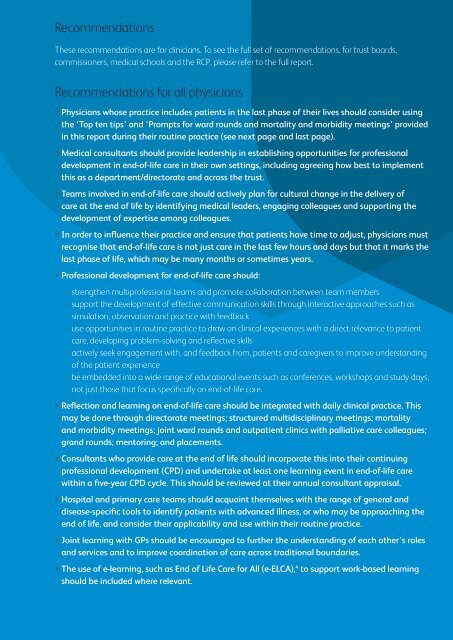End-of-life care: leaflet for clinicians - Royal College of Physicians
End-of-life care: leaflet for clinicians - Royal College of Physicians
End-of-life care: leaflet for clinicians - Royal College of Physicians
Create successful ePaper yourself
Turn your PDF publications into a flip-book with our unique Google optimized e-Paper software.
RecommendationsThese recommendations are <strong>for</strong> <strong>clinicians</strong>. To see the full set <strong>of</strong> recommendations, <strong>for</strong> trust boards,commissioners, medical schools and the RCP, please refer to the full report.Recommendations <strong>for</strong> all physicians> <strong>Physicians</strong> whose practice includes patients in the last phase <strong>of</strong> their lives should consider usingthe ‘Top ten tips’ and ‘Prompts <strong>for</strong> ward rounds and mortality and morbidity meetings’ providedin this report during their routine practice (see next page and last page).> Medical consultants should provide leadership in establishing opportunities <strong>for</strong> pr<strong>of</strong>essionaldevelopment in end-<strong>of</strong>-<strong>life</strong> <strong>care</strong> in their own settings, including agreeing how best to implementthis as a department/directorate and across the trust.> Teams involved in end-<strong>of</strong>-<strong>life</strong> <strong>care</strong> should actively plan <strong>for</strong> cultural change in the delivery <strong>of</strong><strong>care</strong> at the end <strong>of</strong> <strong>life</strong> by identifying medical leaders, engaging colleagues and supporting thedevelopment <strong>of</strong> expertise among colleagues.> In order to influence their practice and ensure that patients have time to adjust, physicians mustrecognise that end-<strong>of</strong>-<strong>life</strong> <strong>care</strong> is not just <strong>care</strong> in the last few hours and days but that it marks thelast phase <strong>of</strong> <strong>life</strong>, which may be many months or sometimes years.> Pr<strong>of</strong>essional development <strong>for</strong> end-<strong>of</strong>-<strong>life</strong> <strong>care</strong> should:– strengthen multipr<strong>of</strong>essional teams and promote collaboration between team members– support the development <strong>of</strong> effective communication skills through interactive approaches such assimulation, observation and practice with feedback– use opportunities in routine practice to draw on clinical experiences with a direct relevance to patient<strong>care</strong>, developing problem-solving and reflective skills– actively seek engagement with, and feedback from, patients and <strong>care</strong>givers to improve understanding<strong>of</strong> the patient experience– be embedded into a wide range <strong>of</strong> educational events such as conferences, workshops and study days,not just those that focus specifically on end-<strong>of</strong>-<strong>life</strong> <strong>care</strong>.> Reflection and learning on end-<strong>of</strong>-<strong>life</strong> <strong>care</strong> should be integrated with daily clinical practice. Thismay be done through directorate meetings; structured multidisciplinary meetings; mortalityand morbidity meetings; joint ward rounds and outpatient clinics with palliative <strong>care</strong> colleagues;grand rounds; mentoring; and placements.> Consultants who provide <strong>care</strong> at the end <strong>of</strong> <strong>life</strong> should incorporate this into their continuingpr<strong>of</strong>essional development (CPD) and undertake at least one learning event in end-<strong>of</strong>-<strong>life</strong> <strong>care</strong>within a five-year CPD cycle. This should be reviewed at their annual consultant appraisal.> Hospital and primary <strong>care</strong> teams should acquaint themselves with the range <strong>of</strong> general anddisease-specific tools to identify patients with advanced illness, or who may be approaching theend <strong>of</strong> <strong>life</strong>, and consider their applicability and use within their routine practice.> Joint learning with GPs should be encouraged to further the understanding <strong>of</strong> each other’s rolesand services and to improve coordination <strong>of</strong> <strong>care</strong> across traditional boundaries.> The use <strong>of</strong> e-learning, such as <strong>End</strong> <strong>of</strong> Life Care <strong>for</strong> All (e-ELCA), 4 to support work-based learningshould be included where relevant.

















